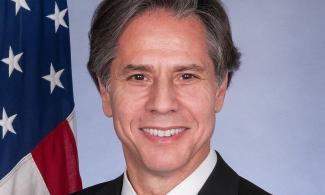
Joly disclosed this in an open letter to the United States’ Secretary of State, Anthony Blinken, on his visit to Nigeria.
Eva Joly, an anti-corruption activist and co-founder, Corruption Hunters’ Network, says Nigeria’s corruption fighters are working and operating in an unsafe environment.
Joly disclosed this in an open letter to the United States’ Secretary of State, Anthony Blinken, on his visit to Nigeria.

Blinken is expected to visit Kenya, Nigeria, and Senegal from November 15 to 20 to underscore the depth and breadth of the country’s relationships with African partners.
Joly asked the US Secretary of State to tell President Muhammadu Buhari during their meeting to ensure Nigeria’s corruption fighters have “a safe and open operating environment” in which to carry out their vitally important work.
“Too many corruption fighters have already suffered from the absence of such an environment, from Maltese journalist Daphne Caruana Galizia, to Rwandan anti-corruption lawyer Gustave Makonene, to Abdullahi Muazu, head of forensics for Nigeria’ Economic and Financial Crimes Commission. These are just a few of the many killed in the line of duty,” she said.
“As you prepare to meet with Nigerian President Muhammadu Buhari, you should know that Nigeria is an especially dangerous place for corruption fighters. Mr. Muazu is only one of many EFCC staff who lost their life fighting corruption in Nigeria. Indeed, Nuhu Ribadu, the EFCC’s first chair, and Ibrahim Magu, the most recent past chair, both barely survived assassination attempts, in Ribadu’s case, two.
“In Nigeria, when the bullets miss their target, the corrupt turn to what anticorruption campaigners term “lawfare” – the abusive use of the law for political ends. In Ribadu’s case, it was “reassignment” to a one-year training program at an institute where he was a frequent lecturer and which, among other things, meant he was no longer entitled to protection by the state security service. Ribadu then resigned from service and continued to speak out against corruption in Nigeria.
“The Ribadu experience apparently taught the forces of corruption in Nigeria that just forcing a corruption fighter from office was not enough. The lawfare campaign against Magu is being waged at a whole new level. At a time when the EFCC was reportedly investigating the current Attorney General for corruption, Magu was picked up by the police and detained for alleged corruption - allegations that had already been investigated and dismissed three years previously.
“Suspended from office pending the outcome of a Panel of Inquiry set up; he was denied access to the evidence against him for several weeks and repeatedly refused permission to address the inquiry or to cross-examine witnesses. The inquiry’s mandate and terms of reference were never disclosed, nor was the timeline to which it was expected to operate, exposing Magu to an open-ended intimidatory process. In the meantime, Magu, who had overseen the successful prosecution of numerous senior politicians and the seizure of millions of dollars’ worth of corruptly obtained assets, has been moved from the EFCC. His ultimate fate remains in question.
“A lawful campaign is also being waged against Olanrewaju Suraju, a prominent anti-corruption activist. He is accused by former Nigerian Attorney General Mohamed Adoke of forging documents implicating Adoke in an enormous corruption scheme that stands to cost Nigerian literally billions in lost revenue. The forgery allegations against Suraju were quickly dropped after he showed the documents were genuine. But while Suraju was released, a police unit which officially investigates only police misconduct has repeatedly demanded that he travel the 300 miles from his home in Lagos to the police headquarters in Abuja for further questioning – despite Suraju obtaining a court order preventing the police from further harassing him.
“Suraju has now been charged under a “cyberstalking” law that West Africa’s ECOWAS Court of Justice, has ruled incompatible with international human rights undertakings and which the Nigerian government itself has promised to amend. The indictment, widely circulated in the press but yet to be served on Suraju, accuses him of defaming Adoke. I know from personal experience the toll the threats of violence and the constant lawfare-like attacks take on those committed to fighting corruption. For that reason, I helped found the Corruption Hunters’ Network, a group dedicated to standing up when those fighting corruption themselves become a target. I write on behalf of the Network and all those whom the Network is committed to protecting – in Nigeria and elsewhere.
“The fight against corruption fighters is clearly escalating in Nigeria. This is despite President Buhari’s personal commitment to putting an end to corruption. In your meeting with President Buhari, I urge you to press him to make good on your own President’s goal of ensuring Nigeria’s corruption fighters have “a safe and open operating environment” in which to carry out their vitally important work.”